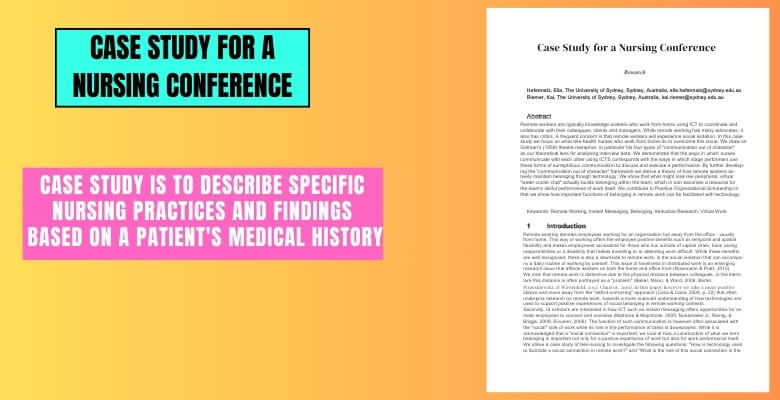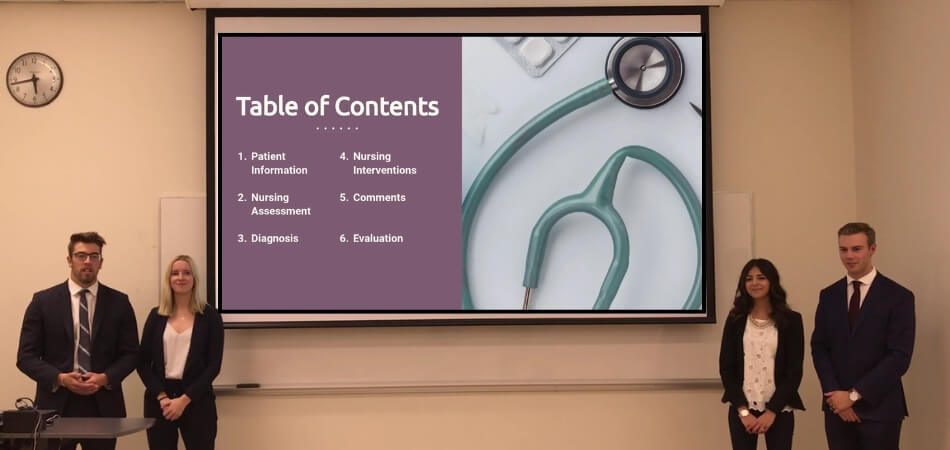Healthcare professionals meet at nursing conferences to share clinical insights and discover innovative practices improving patient care. It is a common question attendees ask at nursing conferences: “Can I present a case study at a nursing conference? ”
Yes, a nursing conference is a great place for you to share clinical expertise, share patient stories, and contribute to evidence-based nursing practice. Outlining patient scenarios, highlighting key points, and designing interesting presentations will impress audiences with real-world healthcare challenges and advances.
This article covers key tips that will help your case study succeed at nursing conferences. Let’s dip in and expand the discussion on improving patient outcomes.
What is a Case Study for a Nursing Conference?
The purpose of a case study is to describe specific nursing practices and findings based on a patient’s medical history. It highlights the challenges and successes nurses face during care delivery, aiming to share valuable lessons, innovative strategies, and evidence-based practices with fellow healthcare professionals.
In case studies, the emphasis is on presenting the complete patient journey, encompassing medical conditions, treatments, and outcomes. This method helps to visualize nursing theories and practices in real-world situations, offering a practical perspective on care. When attending a Canadian nursing conference, sharing your case study can contribute to a broader knowledge of these practices and how they can be applied internationally.
Case studies are crucial in nursing education because they foster discussion, explore diverse techniques, and improve clinical skills. Most public health nursing conferences provide a platform for nurses to gain global awareness and develop innovative solutions through the presentation of their papers.
Can I Present a Case Study at a Nursing Conference?
Several conference organizers including Global Conference Alliance Inc. allow you to present your case study, but you will need to prepare and organize it properly. When asking yourself, “Can I present a case study at a nursing conference?” it’s important to understand that the quality and relevance of your content are key. Here are some tips to help you.
- Choose Your Case: Select a patient scenario that highlights a significant aspect of nursing practice, such as a complex medical condition or a treatment outcome that challenges current knowledge or involves innovative approaches.
- Outline the Story: Develop a detailed outline of the patient’s background, condition, diagnostic process, treatment interventions, and outcomes. This structured process provides clarity and efficiency in presenting your case study.
- Identify Learning Points: Highlight important information collected from managing the case, especially clinical decision-making processes, patient responses to treatment, and any unique challenges faced during treatment. These facts add depth and significance to your presentation.
- Draft Your Presentation: Prepare an engaging presentation that introduces the case study, presents relevant patient data, discusses critical decision points, and concludes with key takeaways. Use visuals and data to support your speech effectively.
- Practice Your Talk: Rehearse your presentation repeatedly to refine your delivery, provide information clarity, and maintain timing. Focus on outlining key points, maintaining audience engagement, and adjusting pace for clarity.
- Prepare for Questions: Be prepared to answer questions related to the logic behind clinical decisions, the efficacy of the treatment, and the patient outcomes in your case study. Be ready to provide detailed explanations, improving audience understanding and interaction.
- Create Handouts (Optional): Consider preparing supplementary materials summarizing essential aspects of your case study for attendees to reference. Include relevant literature citations, further reading suggestions, and contact details for follow-up discussions.
- Attend the Conference: Arrive early to set up your presentation space and familiarize yourself with the venue. Deliver your presentation confidently, demonstrating energy and expertise in discussing your case study with fellow attendees.
- Engage with Attendees: Discuss your case study with audience members after the presentation. Exchange insights, answer questions, and explore collaborative opportunities to advance professional communication and knowledge sharing.
- Reflect and Improve: Reflect on feedback received from peers and attendees to refine your presentation skills and improve future presentations. Continuously look for opportunities to contribute to nursing practice advancement through evidence-based insights and collaborative learning.
Presenting a case study at a nursing conference serves as a platform to contribute to evidence-based practice, share clinical experiences, and promote professional growth within the nursing community. If you’re wondering about what things to do after missing a nursing conference session, consider incorporating a brief overview of what was discussed during that session into your presentation to keep your audience informed.
How Can I Present a Case Study at a Nursing Conference?
There are a few steps that can help you present your case study at healthcare conferences:
- Choose a relevant case from your practice.
- Create a structured outline highlighting the patient’s history, treatment, and outcomes.
- Start with a brief overview of your case and its importance.
- Describe the patient’s condition and relevant medical history.
- Explain the methods used and their reasons.
- Present the treatment results and any challenges faced.
- Summarize key findings and lessons learned from the case.
- Rehearse your presentation to maintain clarity and stay within the time limits.
- Prepare slides or visuals to support your points and engage the audience.
- Be open to questions and feedback from peers and experts at the conference.
Presenting a case study at a nursing conference effectively involves thorough preparation, engaging delivery, and strategic follow-up after nursing events to maximize impact and professional growth. By showcasing real-world applications and outcomes, you can contribute to the collective knowledge and best practices within the nursing community.
5 Parts of a Good Case Study
A nursing conference case study usually follows a structured format that includes essential sections. The book discusses patient scenarios, nursing interventions, etc. Here are some major parts of a nursing conference case study.
Title
In a case study, the title captures the main idea in a brief, clear sentence. It should be short and informative, giving readers a clear idea of what the case study will focus on. A well-chosen title can attract attention and set expectations for the content that follows.
Overview
The overview provides a summary of the case study, including its purpose and context. It provides background information, such as the situation and key stakeholders involved. This section sets the stage for understanding the problem and the steps taken to resolve it.
Problem
The following section describes the central issue or challenge faced by the case study. It describes the specific problem faced by the organization, individual, or situation discussed in the study. This part explains why the case study is relevant and what justifies the need for action or analysis.
Solution
In the solution section, it describes how the problem was resolved. A description of the strategies, methods, or solutions used to resolve the identified challenges is provided. This part of the case study highlights the decision-making process and shows how the problem was overcome.
Results
An overview of the solution’s effects and outcomes is presented in the results section. It discusses the actual benefits achieved, such as performance improvements, cost savings, or improved performance. This part of the case study provides evidence of success or lessons learned from the experience.
Nursing conference case studies provide valuable insights into patient care, highlighting effective practices and improving professional learning among healthcare providers.
Benefits of Presenting a Case Study at a Nursing Conference
Case studies presented at nursing conferences can help nurses gain a deeper knowledge of real-world situations. Here are some benefits.
Knowledge Sharing and Professional Development
Through case studies, healthcare professionals can share unique patient care experiences and innovative practices with their peers, creating a culture of learning among them and developing their professional skills. Basically, writing a nursing conference bio that highlights your expertise can further improve your professional presence at these events.
Networking Opportunities
Presenting a case study allows nurses to connect with colleagues, researchers, and healthcare leaders, facilitating collaboration and the exchange of ideas. These interactions are essential for expanding professional networks and discovering new career opportunities.
Recognition and Visibility
The presentation highlights the presenter’s skills and contributions to the nursing profession, raising his or her professional profile. This acknowledgement is crucial for career advancement and credibility as a healthcare provider
Contribution to Evidence-Based Practice
In nursing practice, case studies are often a valuable source of information about effective strategies and outcomes. By presenting their findings, nurses can influence clinical decision-making and improve patient care outcomes.
Inspiration and Motivation
By attending and presenting at conferences, nurses can gain knowledge about the most up-to-date research, best practices, and innovations in healthcare. For first-time conference attendees, this experience can inspire a passion for continuous learning and professional development, giving them a solid foundation for their nursing careers.
An in-person presentation at a nursing conference increases professional development, raises visibility, contributes to the advancement of nursing practice, and inspires future generations of nurses.
Limitations of a Case Study for a Nursing Conference
The case studies presented at nursing conferences offer detailed insights, but may not be applicable for several reasons. Here have a look at them.
Generalizability
There is difficulty in generalizing the findings of case studies to other nursing contexts or scenarios since they often focus on specific cases or individuals within a particular context. Each case’s unique situation may not reflect the complexity and variation of other situations. Although case studies provide detailed explanations of specific scenarios, they may not be universally applicable.
Sample Size
Typically, case studies involve a small number or even a single case. This small sample size limits the study’s power and applicability. Small samples may not accurately represent the range and patterns of a larger population of patients. Thus, case studies should be analyzed carefully and may not be widely applicable without further testing.
Depth vs. Breadth
The case study may provide detailed and useful insights into specific cases but lacks range when it comes to addressing a wide range of issues. The depth-focused approach provides valuable qualitative data but does not capture all the challenges or variations in nursing practice. Therefore, case studies may not provide a complete view of overall healthcare trends and issues.
Time and Resource Intensive
It takes time, resources, and expertise to prepare and present a case study. In a conference venue where time is limited, it can be difficult to provide detailed findings. In order to provide solid findings and meaningful contributions to nursing practice, case study research involves data collection, analysis, and evaluation.
Difficulty in Compare
There are differences in methodologies, contexts, and research objectives that make a comparison difficult. The unique facts and research approaches of each case study make direct comparability difficult. Evidence-based healthcare policy and practice are difficult to develop. Despite individual case studies being valuable, methodological differences must be considered when combining findings.
Ethical Considerations
Protect participants’ identities and personal information when presenting sensitive information in public venues like conferences. Ethics require securing participants’ identities and personal information. Healthcare settings require respect for participants’ choices and rights to obtain informed consent. A conflict may arise when sharing case study findings while balancing transparency and privacy.
Frequently Asked Questions
A nursing conference can be an exciting opportunity for nursing students to present their case studies. Here are some frequently asked questions and their answers to help you along the way.
Can I Present a Case Study Based on a Collaborative Healthcare Initiative Involving Multiple Institutions?
Absolutely, by presenting group case studies, it highlights teamwork, innovative strategies, and shared outcomes across institutions, increasing conference discussions with diverse perspectives and providing networking opportunities among healthcare professionals.
How Can I Assure My Case Study Effectively Communicates Its Impact on Patient Outcomes?
By providing clear, concise evidence, such as statistics or patient testimonials, it is possible to demonstrate the positive impact of the group case study on patient outcomes. Additionally, provide a clear explanation of the process used to reach the desired outcomes. Finally, measure the results of the case study and make any necessary adjustments.
What Role Do Visuals and Data Play in Enhancing Nursing Conference Case Study Presentation Effectiveness?
Visuals and data are powerful tools that can clarify the concepts presented in the case study. They can also be used to explain the case’s processes and outcomes, making the learning process more effective. Visuals and data can also be used to engage the audience and make it easier to follow along.
Is It Beneficial to Include Personal Reflections or Insights Gained From Managing the Case in My Presentation?
Yes, personal reflections and insights from managing the case can be included. This can help to show the presenter’s thought process and provide a more personal touch to the presentation. Additionally, it can provide an opportunity to share unique perspectives and insights into the case.
How Can Presenting a Case Study at a Nursing Conference Contribute to My Professional Development?
Attending a nursing conference is an ideal way to network with other professionals and gain valuable knowledge. Presenting a case study at the conference can help demonstrate your expertise in the field and further establish you as a thought leader. Additionally, it can open doors to new job opportunities.
Bottom Line
Taking part in a nursing conference offers healthcare professionals the chance to share clinical insights and contribute to evidence-based practice by presenting a case study. For the application to be successful, it must be filled out accurately, with all details correct. To maintain trustworthiness and make sure your submission is unique, it is essential to correct errors promptly.
Errors can cause missed opportunities for presentations or miscommunication. Therefore, careful preparation and attention to detail are key. So, your question was, “Can I present a case study at a nursing conference?” Absolutely, and by adhering to these guidelines, you can effectively showcase your expertise and enrich professional dialogue.








